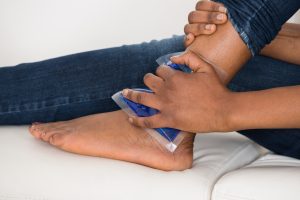New Jersey Foot Doctor Provides Treatment For Your Foot and Ankle Injuries
Foot & Ankle Trauma
 Fall down? Trip? Have an accident? Foot and ankle trauma is extremely common no matter how young or old you are. Ankle fractures, sprain and strains, foot fracture, Achilles tendon rupture and other types of trauma occur all the time. Athletes and non-athletes, weekend warriors and the sedentary can all experience foot and ankle trauma at any moment.
Fall down? Trip? Have an accident? Foot and ankle trauma is extremely common no matter how young or old you are. Ankle fractures, sprain and strains, foot fracture, Achilles tendon rupture and other types of trauma occur all the time. Athletes and non-athletes, weekend warriors and the sedentary can all experience foot and ankle trauma at any moment.
Foot Fracture
There are 26 bones in the foot, so the chances of a foot fracture are pretty good. While a fall, severe twist or fallen object can cause a foot fracture, repeated stress on the bone overtime can also cause the formation of small cracks or stress fractions. Severe pain, bruising or swelling, numbness of toes or foot, decreased range of motion, inability to walk comfortably or a visible deformity can be experienced when a foot fracture has taken place.
Foot Fracture Treatment in New Jersey
You’ll want to come to us at the first twinge of pain. When the injury is less severe, you may only need crutches and stiff-soled shoes to protect the fracture. Toes may also be taped together to protect injured toes. More serious fractures may require surgery to realign the bones. A cast or splint will be secured on the foot after surgery. Crutches will help you walk and additional x-rays will evaluate the healing process.
Achilles Rupture or Tear
The Achilles tendon is fibrous tissue that connects the heel to the muscles of the lower leg. When it ruptures or tears, the initial pain is intense. From that point on, you’ll have trouble flexing or pointing the foot because your Achilles tendon is no longer attached and functional. Luckily, you probably won’t experience much pain after that initial jolt.
Achilles Rupture Treatment
No two ways about it, this injury requires surgery. Recovery involves six weeks non-weight-bearing in a cast, then three to four weeks in a walking boot with physical therapy for several weeks to regain strength.
Ankle Fractures
Whether it’s a small chip off the anklebone or a major dislocation shattering many bones, ankle fractures are occur when the ankle rolls. Often mistaken for an ankle sprain, ankle fractures cause pain, swelling, bruising, redness, and difficulty walking or moving the ankle joint. When dislocated, you may see blistering or an abnormal appearance of the ankle. If bone is seen protruding through the skin, get to the hospital immediately.
Ankle Fracture Treatment in New Jersey
Until you’re evaluated by us, treatment for ankle fractures is the same as ankle sprain treatment. It’s all about RICE – Rest, Ice, Compression, Elevation. Cease physical activity. Apply ice 20-30 minutes per hour when awake. If possible, wrap your ankle snugly (but not too tightly) with an ace bandage. Elevate your foot often to at least your hip level. Medical treatment will involve X-rays to investigate broken bones. Immobilization is necessary for all ankle fractures to allow sufficient bone healing, so we may provide a below-knee cast or boot. Pain medication and/or anti-inflammatories will help reduce discomfort and pain. Without adequate care, long-term complications can include pain, arthritis, and severe ankle and foot deformities.
Serving all your foot and ankle concerns, Family Foot & Ankle Center of Central Jersey provides comprehensive care for infants, children, teenagers, adults, and seniors.
Please call today for an appointment (732) 851-1617.

